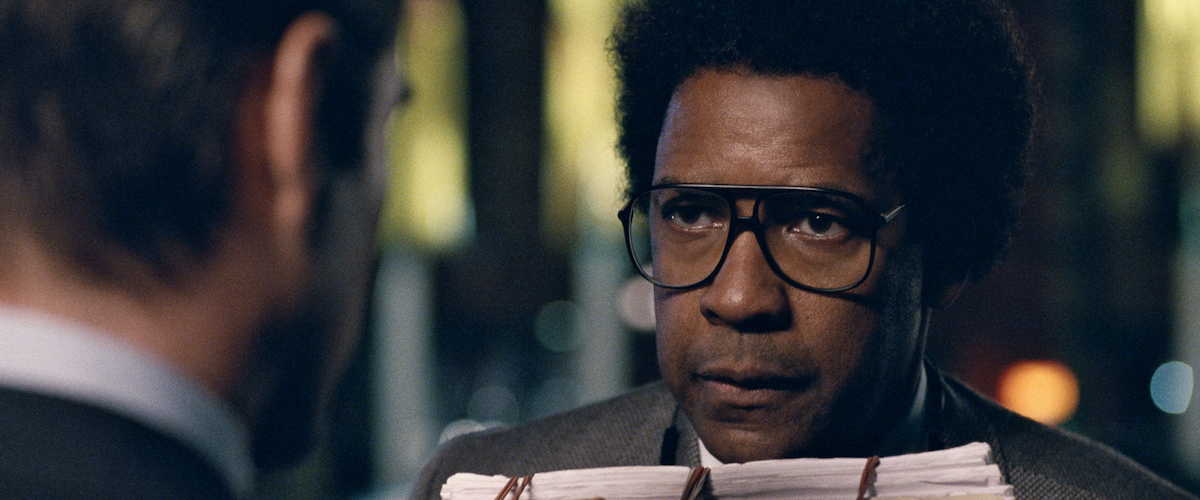“Roman J. Israel, Esq.” looks like prime Oscar bait. It has the glow of nobility and importance emanating from every frame courtesy of Robert Elswit’s cinematography. The screenplay by writer-director Dan Gilroy is filled with dialogue about civil rights, the prison industrial complex and the common man. And its lead actor’s famous good looks have gone AWOL so he may enroll in the Academy voter’s favorite class, Frumpy 101.
But don’t be fooled! This is not Oscar bait at all. “Roman J. Israel, Esq.” is the kind of horrendous hot mess an actor makes directly after he wins the Oscar. Granted, Denzel Washington didn’t win the golden statuette he deserved last year, but if he had, it might have justified why he chose this lifeless story as his follow-up. My best guess is that Denzel wanted to cosplay as Eddie Murphy’s Norbit. He would have made a far better Randy Watson from “Coming to America,” if you ask me.
But I digress. The version of “Roman J. Israel, Esq.” hitting theaters this week is not the same one that drew critical scorn at the Toronto Film Festival. The new cut is 13 minutes shorter and certain plot points have been edited in a different order. There’s some vague notion that a “major reveal/spoiler” has been moved to an earlier spot in the film. Gilroy’s story makes so little narrative sense that I have no idea what they’re talking about, so I am issuing a spoiler warning from here on as a precautionary measure.
Roman is a lawyer in a two-man criminal defense law firm in Los Angeles. He and his boss, William Jackson, handle cases for the downtrodden and underprivileged. William is the public face of the firm, arguing in court and meeting with clients. Roman does all the research and advises on how to approach each case. It’s hinted that Roman has some form of Asperger’s, though his Rain Man-like recollection of the number of every single statute leans him more heavily into savant territory. It is also hinted that Roman’s lack of social cue recognition may have been the reason William never sent him to court. Of course, as “Roman J. Israel, Esq.” opens, William has suffered a soon-to-be-fatal heart attack and Roman has to cover for him in court.
Before we see Roman in action, however, we’re treated to voiceover by Washington that is meant to set up a flashback structure. The narration accompanies a legal brief Roman is writing. The brief is two paragraphs of legalese interspersed with nonsense, and we get to see it typed in its entirety on the screen. As letters fill the screen, the score gets louder and more bombastic in a vain attempt to telegraph suspense. In the brief, Roman calls himself a hypocrite who has sold out his own belief system. He casts himself as plaintiff and defendant in this damning confession.
Eventually, we’ll return to this brief, but for now, we’re thrown three weeks into the past where Roman makes his first court appearance in decades. Despite being told by William’s assistant to simply ask for continuances, Roman engages the case. His client is getting a raw deal, to be sure, but Roman exacerbates the situation by arguing with the judge until he is held in contempt. Later, Roman will again go against his firm’s wishes by telling off the district attorney in regards to a plea offer. Both of these scenes are played for laughs in the film’s trailer, but neither scene is so damn funny in context: that contempt charge gets William’s near-bankrupt firm slapped with a $5,000 fine; the district attorney flap indirectly results in a client’s murder.
It’s clear that Washington and Gilroy want to cast Roman as some kind of grumpy genius—he’s the Dr. House of lawyers. The problem is that, unlike Dr. House, Roman is horrible at his job. You would not want this man representing you, nor would you want him, as Maya (Carmen Ejogo) discovers, to come speak at your activism meeting. Since William’s firm was known for its community service, Maya hopes Roman can inspire her group. But Roman’s ideas about women are as outdated as his clothing. This too is played for laughs in the trailer; in the film, the scene ends with an angry activist leveling the F-word at a confused Roman, turning this important meeting into chaos.
The film’s romantic interest Maya has the thankless job of echoing how great and inspiring Roman is supposed to be. She’s necessary because we never see a single thing to support why we’d care about Roman or his story. On a dinner date, Maya is so overwhelmed with admiration for Roman that she bursts into tears, and while Ejogo convincingly weeps, I couldn’t help but ask myself “why?” You’ll be asking yourself “why” a lot too, as this lifeless, interminable movie plays as if the filmmakers threw the footage up in the air and edited it in the order it hit the floor.
Why, for example, does Roman do what I think is that aforementioned “major reveal/spoiler”? I’ll tread lightly here. Roman suddenly decides to accept money from a shady source, a breach of ethics that comes out of nowhere and is characteristically abnormal. Roman uses that money to bring his wardrobe up to the 21st century, to move into a swanky apartment and to tighten up his coif. He does not need the money, as he’s been hired by the offices of rich lawyer George Pierce (Colin Farrell), the man whom the now-deceased William had selected to dissolve Roman’s firm. Roman’s actions may or may not be the hypocrisy he referred to in his damning brief, yet one wonders why he couldn’t have just used his salary for his adventure rather than dirty money. His actions are inexplicable and serve only to give the film the tragic ending it neither earns nor deserves.
“Roman J. Israel, Esq.” is rather insulting to folks like me who are on the spectrum. Washington gives one of his rare bad performances here, turning Roman into an improv sketch filled with tics, mannerisms and an overreliance on his attire. He’s never a real person, even when he’s having a paranoid episode or, in a fit of terror, trying to outrun a sports car in a U-Haul truck. The most memorable thing about him is his Eddie Kendricks ringtone, which plays “Keep on Truckin’” whenever his flip phone lights up.
The film is also insulting in how it treats Roman’s pet activism project. Throughout the film, Roman obsesses over the contents of the case he always drags with him in an attaché. It’s a controversial brief designed to change the way people of color are treated by the courts. We do not learn anything about this potentially fascinating court filing, nor do we spend enough time with the people who inspired Roman’s obsession. Plus, the film’s ending implies that Roman could only achieve his goal through a brutal sacrifice and a helpful White savior who’s jarred into action only when the dead Black body is someone he cares about. As the Spinners’ classic “I’ll Be Around” played over the closing credits, all I could do was ask myself “why?”




















